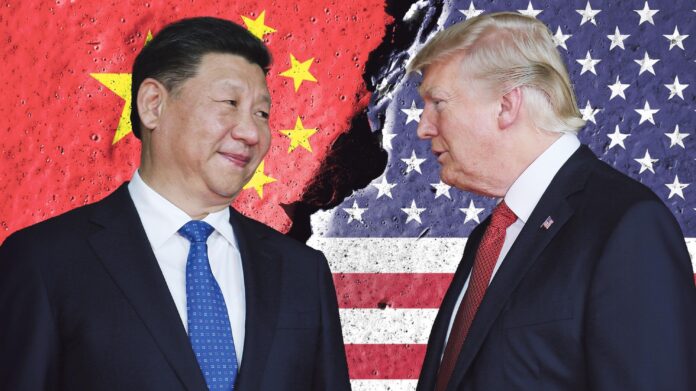The United States Postal Service (USPS) announced a temporary suspension of all inbound international package acceptance from China and Hong Kong, effective immediately. This dramatic move comes as President Donald Trump and Chinese President Xi Jinping engage in a rapidly escalating trade war, marked by newly imposed tariffs and the threat of further sanctions.
"The Postal Service will temporarily suspend only international package acceptance of inbound parcels from China and Hong Kong Posts until further notice," the USPS stated in an official release. Importantly, the statement clarified that the flow of letters and flats from these regions would remain unaffected. While the USPS did not explicitly link the suspension to the trade tensions, the timing is undeniably significant, occurring amidst a flurry of retaliatory actions between the two global economic giants.
President Trump's decision to impose a 10% tariff on all Chinese imports ignited the current conflict. This sweeping measure prompted immediate countermeasures from Beijing, including a 15% tariff on imported US coal and liquefied natural gas (LNG). Further retaliatory tariffs of 10% were levied on US crude oil, agricultural machinery, large-displacement automobiles, and pickup trucks.
The impact of these tariffs extends beyond immediate financial repercussions. The temporary pause by the USPS is expected to cause significant delays in package deliveries from China and Hong Kong, affecting countless consumers who frequently purchase goods from online retailers sourcing products from these regions. Many items sold on popular shopping websites originate from China, although some utilise alternative shipping methods. The full extent of the disruption remains to be seen, but it is certain to impact businesses and consumers alike.
The USPS suspension also coincides with President Trump's decision to end the 'de minimis' provision (Section 321), which allowed for the duty-free import of small packages. This move, part of a broader strategy to implement additional tariffs on China (10%), Canada (25%), and Mexico (25%), has further complicated the situation. The temporary suspension of the 25% tariffs on Canada and Mexico, secured through a 30-day pause in exchange for concessions on border and crime enforcement, offers a glimmer of hope for de-escalation, but the situation with China remains tense. A June 2023 report from the US congressional committee on China highlighted the significance of the 'de minimis' provision, noting that nearly half of all packages shipped under this provision originated from China.
President Trump, however, has shown no inclination to quickly resolve the conflict through direct communication with President Xi. When asked about China's retaliatory tariffs, Trump simply stated, "That's fine," indicating a firm stance and a lack of urgency in seeking immediate dialogue. While President Xi reportedly reached out to President Trump to discuss the matter and potentially initiate negotiations, White House spokeswoman Karoline Leavitt confirmed that a call between the two leaders was still pending. "President Xi did reach out to President Trump to speak about this, maybe to begin a negotiation. So we'll see how that call goes," Leavitt told Fox Business Network.
China's measured response to Trump's tariffs, while retaliatory, also suggests a desire for negotiation. Liu Pengyu, spokesperson for the Chinese embassy in Washington, expressed hope for cooperation between the two nations to maintain stable and healthy bilateral ties. The International Monetary Fund (IMF) echoed this sentiment, emphasizing the importance of constructive dialogue to resolve disagreements and facilitate trade. The IMF's statement highlights the broader global concern that escalating protectionist policies could negatively impact investment and disrupt global supply chains.
Capital Economics, a UK-based research firm, estimated that China's additional tariffs would affect approximately $20 billion in annual imports, a relatively small figure compared to the $450 billion worth of Chinese goods subject to Trump's tariffs. Julian Evans-Pritchard, the firm's head of China Economics, described the Chinese measures as "fairly modest" and designed to send a message to the US. The relatively limited nature of China's initial response suggests a calculated approach, aiming to avoid an all-out trade war while simultaneously expressing its displeasure with Trump's actions.
The implications extend beyond the US and China. President Trump hinted at the European Union as his next target for tariffs, prompting a response from Ursula von der Leyen, head of the EU's executive European Commission. While expressing a willingness to engage in tough negotiations, von der Leyen stressed the EU's determination to protect its interests. Although technical-level contact exists between the European Commission and the US administration, direct communication between von der Leyen and Trump has yet to occur.
China's retaliatory measures also include an anti-monopoly investigation into Google, placing PVH Corp (Calvin Klein's parent company) and Illumina on a list for potential sanctions. PVH expressed surprise and disappointment at this decision, while Illumina and Google declined to comment directly. Further, China announced export controls on certain metals crucial for electronics, military equipment, and solar panels. The 10% duty on electric trucks imported from the US could potentially affect Tesla's Cybertruck, though Tesla offered no immediate comment.
The new Chinese tariffs are not scheduled to take effect until Monday, leaving a window for potential negotiations between Washington and Beijing. This period of uncertainty underscores the fragility of the situation and the potential for further escalation. Oxford Economics downgraded its China economic growth forecast, citing the early stages of the trade war and the high likelihood of further tariffs. President Trump himself suggested that further tariffs could be imposed unless China curbed the flow of fentanyl into the US. China, in turn, has labelled fentanyl as an American problem, indicating its intention to challenge the tariffs at the World Trade Organization and pursue other countermeasures.
The relatively small proportion of China's crude oil and LNG imports sourced from the US (1.7% and just over 5%, respectively) suggests that the impact of the tariffs on energy supplies may be limited. However, the potential for tariffs to become a recurring tool, leading to market volatility, remains a significant concern, as noted by Gary Ng, senior economist at Natixis in Hong Kong.
The temporary reprieve granted to Canada and Mexico, following agreements on border enforcement, highlights the potential for negotiated solutions, but the situation with China remains far from resolved. The EU, too, is actively seeking early talks with the US to prevent the imposition of tariffs, reflecting the widespread concern that this escalating trade war could have far-reaching and potentially devastating consequences for the global economy.










